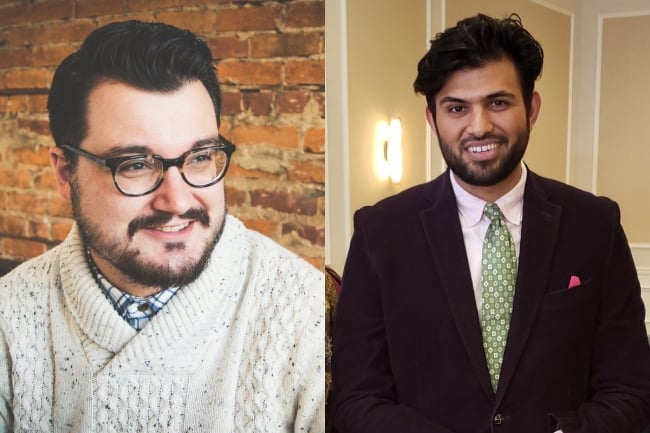You have /5 articles left.
Sign up for a free account or log in.

Two former students filed a lawsuit against the University of Wisconsin at Milwaukee in 2014. In April, they finally settled.
Photos courtesy of M. Samir Siddique and Taylor Scott
Two former students have settled an eight-year-long lawsuit against the University of Wisconsin at Milwaukee, marking the “formal end” of a series of lawsuits filed by students over the controversial and “illegal” disbandment of the student government association in 2013, the plaintiffs’ attorney said.
According to Gary Grass, the lawyer representing former students M. Samir Siddique and Taylor Scott, the settlement—reached in April but officially transmitted by the Wisconsin Court of Appeals last week—closes a troubling chapter in the relationship between university administrators and student leaders. Siddique and Scott alleged in the lawsuit that then chancellor Michael Lovell, who is now the president of Marquette University, illegally refused to recognize the Student Association’s elections in 2013. (This paragraph has been updated to remove the incorrect name of the winner of that election.)
In January 2014, Scott and Siddique filed a complaint against the university in Milwaukee County Circuit Court alleging that Lovell acted illegally when he dissolved the Student Association. An independent investigation by a team of officials at the University of Wisconsin at Whitewater uncovered problems with the 2013-14 Student Association elections, including old bylaws that were allegedly used to prevent certain students from taking office and lack of availability of party registration forms. Lovell wrote to the outgoing Student Association president that he wouldn’t recognize the new Student Association election results.
“While the UWM administration fully respects the students’ right to self-govern under 36.09(5), we must also be certain that the Student Association, as the sole recognized representative for governance purposes of all UWM students, is, in fact, open and accessible to all UWM students such that official UWM recognition of it as the students’ sole representative is warranted,” Lovell wrote in a letter.
With Lovell refusing to recognize the student government, the judicial branch of the student association appointed a new student government, called the Board of Trustees, which created a new student government constitution. (This paragraph has been updated to reflect the correct order of events.)
‘Puppet Government’
Members of the dissolved Student Association responded to the disbandment by drafting a new student government constitution that guaranteed students the power to select their representatives. After gathering signatures from more than 1,300 students on a petition supporting the new constitution, the disbanded Student Association held elections. Students voted in Siddique as president, and he demanded recognition from Lovell, which the university president refused to grant.
In 2019, Siddique and John McAdams, a former political science professor at Marquette University who died last year, wrote an op-ed in Madison.com, a local news outlet, detailing how university administrators punished Siddique in 2014, ordering him to perform hours of community service and to email students publicly admitting that his group’s views were wrong. They wrote that the consequence for refusing to send the email was indefinite suspension from the university without the ability to transfer, which caused Siddique and Scott, as part a group of about 40 students—including some from the disbanded student government—to sue in 2014.
In the original lawsuit, Siddique and Scott said that Lovell “hand-picked” the student board members as an illegal “puppet government.” Grass argued that the 2013–14 elections should be upheld due to the lack of substance found in the Whitewater investigation, which did not recommend that Lovell dismiss the elections, he said.
“It was probably their influence in the student government elected in 2013 that led the chancellor to illegally reject the election and oversee the appointment of an administration-friendly puppet government,” the complaint stated.
Siddique and McAdams wrote in Madison.com that “controversy existed” between the Student Association and Lovell before the 2013–14 elections. According to the op-ed, Lovell had pushed to increase student fees to fund a new student facility costing over $100 million; the Student Association, which had authority to assess student fees, publicly opposed the proposal.
The issue of whether Lovell acted illegally in disbanding the student government was dismissed on procedural grounds in 2017, according to Grass. And Siddique was absolved of misconduct and was allowed to graduate. Scott said they settled for $150,000 total.
The settlement is “mostly concerned” with whether Siddique’s and Scott’s civil rights were violated when the university attempted to discipline them for calling the Lovell-appointed student government “illegitimate” and for attempting to start a new student government, Grass said. According to Grass, university officials apologized to Siddique and Scott and pledged reforms based on their recommendations. Siddique said the details of those reforms are still being decided. The university also ended all threats of discipline against Scott and Siddique and forgave Scott’s outstanding debt of about $3,500 for tuition and student fees.
“Feelings are very mixed, that something you’ve been involved in for so long is suddenly over. It feels like our claims, which some had treated very dismissively, have been vindicated, even if we did not get a formal judgment,” Grass said in a statement to Inside Higher Ed. “It’s somewhat disappointing not to have an order from a court telling the University to stop some of its bad practices, but I’m cautiously optimistic that we can obtain changes without further legal action, which is always ideal.”
‘No Admission of Liability’
“Given the potential costs of litigation, the university concluded it was in its best interest to resolve four long-pending cases,” a University of Wisconsin at Milwaukee spokesperson said regarding the settlement. “Please note that there was no admission of liability.”
Scott said during mediation for the complaint, university representatives told him and Siddique that their actions had “not been in vain,” since the university pledged reforms based on their recommendations.
“For me, the biggest thing was, we came into this with the hope that we would [effect] some positive change, there would be some policy changes, or even just that we could get them to follow the law, and that they weren’t steamrolling students and their rights under the law,” Scott said in a statement to Inside Higher Ed. “Settlements are nice and everything. I want to reiterate: it’s nice to be apologized to, it’s nice for them to tell us that our actions have not been in vain, and it’s nice to eke out a six figure settlement. But ultimately, I would like the policy change to have occurred and to occur, because that’s really my hope here is that we have affected some positive change.”
Siddique should not have been disciplined for criticizing the university administration, said Will Creeley, legal director of the Foundation for Individual Rights and Expression.
“The settlement is welcome, and frankly … the university should not have taken so long to recognize their obligations,” Creeley said. “Of course, the university here is admitting no wrongdoing. But students have a right to criticize their administrations, and certainly criticize their elected officials on student government. So to the extent that these students are facing discipline for their criticism, this is a good outcome.”
However, Creeley said, he doesn’t expect the settlement to set any sort of precedent.
“First of all, it’s a settlement,” Creeley said. “And second of all, it’s such a unique set of facts that other students are either hopefully unlikely to find themselves enmeshed in similar disputes, or are not going to be able to rely on a settlement or some kind of persuasive authority in their own suit. So it it’s an interesting story, but I think it’s likely limited to the participants here, in terms of its impact.”




